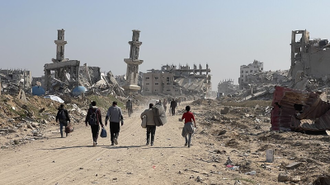Another Resolution? Christians from Jerusalem call for a just peace

Forced Displacement in Gaza, Credit: Wikimedia
Source: A Jerusalem Voice for Justice
Palestinian religious leaders, theologians, activists, and members of Christian civil society groups in Jerusalem have issued a statement, underscoring how the persistent violence casts a deep shadow on the proposed UN Security Council resolution, approved on Monday, 17 November, raising crucial questions about the future of Palestinian self-determination, international responsibility, and the real conditions for peace.
UN Security Council Resolution 2803, based upon a draft of the United States administration, was accepted by 13 of the UN Security Council member states while two (Russia and China) abstained. The resolution seeks to establish a 'Board of Peace', headed by President Trump, that would oversee an International Stabilization Force.
There are some positive aspects to the US-brokered ceasefire of 4 October 2025, and this resolution: less genocide, less domicide, less displacement, and less dismantling of the few Palestinian institutions that still remain. However, despite the ceasefire, the destruction of Gaza and its population is ongoing. (About 250 Gazans have been killed and about 650 injured since the ceasefire went into effect.)
Will the UN resolution lead to Palestinian self-determination? It conditions self-determination on Palestinian 'reforms'. Are the intended reforms meant to end corruption and bad administration or do they seek to impose the acceptance of Israeli/US constraints on self-determination. A people's right to self-determination cannot be conditioned, especially not by those who have prevented this self-determination for decades. Moreover, self-determination begins with a free democratic process, without Israeli or US interference.
There are negative aspects to this resolution too. It smacks of traditional colonialism: the administration of Gaza by foreigners, led by the US President. Undoubtedly, the most negative aspect of the resolution is its lack of a global vision. It ignores the realities in the West Bank (including East Jerusalem): the violent dismantling of Palestinian refugee camps and villages, the extreme violence of the Israeli army and police, and especially Jewish settler vigilantes, the ongoing obstacles to the daily life of Palestinians there and attempts to obliterate their identity. Overall, the resolution adopts a problematic perspective: the problem began on 7 October 2023. However, this ignores the true genesis of the conflict.
There is no way forward unless we are willing to rethink the global situation in Palestine/Israel. Since the British Balfour Declaration of 1917, discourse has been based upon a division into Jew and non-Jew, establishing the inequality that has emerged since then. The 1947 UN partition plan was in direct continuity with British colonial rule: the enforced establishment of a Jewish ethnocentric state. Jews are connected to this land and are not simply colonial settlers. However, their link with the land is not exclusive, and it does not give them a right to dispossess and displace, repress and occupy, destroy and commit genocide. Dismantling the system of ethnocentricity, discrimination and occupation must seek to integrate Jewish Israelis into a new reality that opens up on the horizon - a multi-cultural and pluralist society that ensures equality, justice and peace for all who live in Palestine/Israel today.
Signatories include:
Latin Patriarch of Jerusalem Michel Sabbah (emeritus),
Greek Orthodox Archbishop Attallah Hanna,
Lutheran Bishop of the Holy Land Munib Younan (emeritus),
David Neuhaus SJ, Pontifical Biblical Institute, Jerusalem


















